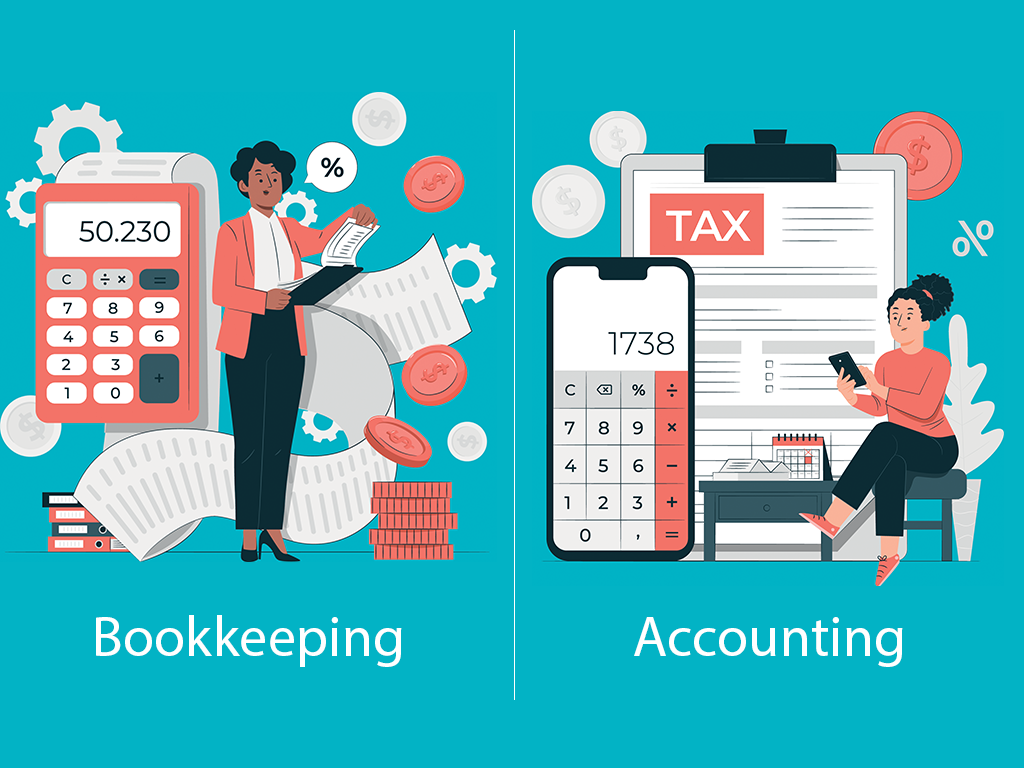Starting a business is akin to setting sail on an ocean of dreams and aspirations, where every decision, no matter how small it may seem, has the potential to drive success or hit an iceberg. In the realm of financial management, two harbingers of good navigation stand out — accounting and bookkeeping. For the uninitiated and even for some seasoned sailors, these two can often be mistaken for the same thing, and yet they couldn’t be more different. This guide is for all small business owners looking to chart their path with clarity when it comes to the financial undertow of their enterprise.
Before you can conquer the seas, you have to master the winds; before you can leverage the insights of accounting, you need to understand the foundation of bookkeeping. Here’s a breakdown that aims to simplify these crucial business functions for you.
Understanding Bookkeeping
Imagine bookkeeping as your business’s daily journal, chronicling every financial transaction with diligent accuracy. It’s the process of recording and organizing all the financial activities of your business in a systematic manner. If we were to draw an analogy, bookkeeping is the engine room of your financial ship, ensuring that everything is running smoothly beneath the surface.
Key Functions of Bookkeeping:
- Recording Transactions: Each time money moves in or out of your business, it needs documentation, and bookkeeping is where these transactions are recorded in the books.
- Invoicing and Payroll: It manages the billing and collections from your customers, as well as ensuring that your employees get paid on time.
- Bank Reconciliation: This process involves matching the balances in your company’s books with the corresponding information on your bank statement.
- Financial Reporting: It also prepares the necessary financial statements such as the income statement, cash flow statement, and balance sheet, based on the data recorded.
Bookkeeping ensures that when the time comes to analyze your company’s performance, the data is at your fingertips and in a format that’s precise and easily understandable.
The Art of Accounting
Accounting is the captain’s wheel, steering the financial ship by not just recording, but also interpreting and analyzing the financial data. It provides a higher-level view that bookkeeping alone can’t offer. Accounting turns the data into actionable insights, helping you make informed decisions about the direction of your business.
Distinctive Focus Areas of Accounting:
- Financial Analysis: It involves comparing financial data over different periods to reveal trends and patterns that can help forecast future business needs.
- Tax Preparation: Accountants utilize the data recorded by bookkeepers to prepare and file taxes in compliance with the regulations, potentially minimizing the tax burden on the business.
- Strategy and Planning: Accountants play a key role in strategic planning, offering financial advice and setting realistic financial goals for the business.
- Audit Preparation: In case of an audit, accountants help prepare audited financial statements, providing a higher level of assurance to stakeholders and regulators.
While bookkeeping speaks the financial language of your operations, accounting translates this into the strategic business intelligence necessary for survival and success.
Why Small Businesses Need Both:
- Employing a full-time accountant might not be feasible in the early stages of a business, making the presence of a skilled bookkeeper even more essential.
- A bookkeeper ensures that all financial data is up-to-date and organized, making the accountant’s job much easier and efficient.
- Clear data from bookkeeping helps the accountant provide more accurate and valuable insights to the business owner.
Recognizing and leveraging the strengths of both these functions can lead to a well-oiled financial machinery that keeps the business in good running order.
Building the Right Team
For small businesses, outsourcing bookkeeping or accounting functions can be a cost-effective and strategic move. It allows the business to tap into a wealth of experience and expertise without the need for a full-time in-house team. When approaching the task of selecting an accounting or bookkeeping service, it’s critical to consider the following:
Look for:
- An Understanding of Your Business: Each industry has its own set of financial idiosyncrasies; a service provider who understands these can be invaluable.
- Technology Integrations: Modern businesses operate in a digital ecosystem; a service that seamlessly integrates with your existing platform is a considerable asset.
- Flexibility and Scalability: A service that can grow with your business and adapt to its changing needs is a service that provides long-term value.
For the small business owner, the finance function might seem like a complex and daunting task. However, by entrusting this responsibility to the right team, you can focus on the critical task of steering your business towards success.
Bridging the Gap with Technology
The advent of technology has revolutionized the accounting and bookkeeping landscape. Software solutions like ABMBooks offer platforms that simplify both these vital functions. Cloud-based services provide real-time access to financial data, enabling informed decision-making no matter where the business owner or accountant may be.
The Advantages of Accounting Software:
- Automation: Reducing manual work means lesser chances of errors, and time saved to focus on strategic analysis.
- Integration: Many software solutions integrate with banking systems, payment gateways, and other business tools, providing a holistic financial view.
- Security: Cloud services often provide bank-level security, ensuring that your financial data is safe and accessible only to those with authorization.
While the human touch remains vital in the form of strategic input, these software platforms can be the perfect co-pilots to guide your business through its financial voyage.
Crafting Your Financial Narrative
In the hustle and bustle of daily operations, the story that your numbers tell is often the last thing on your mind. Yet, it is this narrative that not only helps you understand where you’ve been but also provides the directions for where you’re headed. For small businesses, accounting and bookkeeping are not just tasks to be checked off; they are the building blocks of a financial storyline that can lead to growth and prosperity.
Key Takeaways for Small Businesses:
- Regular bookkeeping ensures that no financial transaction goes undocumented, leaving no gaps in your financial history.
- Proactive accounting can uncover valuable insights about your business, pointing out opportunities for expansion or areas in need of improvement.
- Together, these functions lay the foundation for comprehensive financial management, offering a clear picture of your business that is indispensable for long-term planning.
In the final analysis, when you invest time and resources into getting your accounting and bookkeeping right, you’re investing in the very heart of your business. Whether you choose to learn these skills yourself, hire an in-house team, or outsource, the goal remains the same — to ride the waves with the assurance that comes from knowing your ship is navigating on a clear course.




